Theresa May: Why I was right to introduce police tsars


It was a perfect example of how the system of police governance was broken. Back then, police authorities supposedly held police forces to account. In reality, these were little more than invisible committees of appointed councillors.
Theoretically, they acted on behalf of the public and had a duty to engage local people and businesses in setting priorities and local taxes. In practice they did nothing of the sort.
Advertisement
Hide AdAdvertisement
Hide AdPublic meetings were barely attended and just one in 15 people knew that they even existed. The decisions they took were communicated only in obscure minutes in forgotten corners of their websites.
Indeed, when I first became Home Secretary, an inspection by Her Majesty’s Inspectorate of Constabulary found that only four of the 22 police authorities inspected were judged to have performed well in two crucial functions – setting strategic direction and ensuring value for money for taxpayers.
And that is why we brought in Police and Crime Commissioners (PCCs) – to be elected, visible, well-known in their communities and accountable to the electorate.
What a change we have seen. Across England and Wales, PCCs receive almost 7,000 items of correspondence every month and more than 85,000 people visit their websites. And that is without taking into account frequent coverage of their activity in newspapers like The Yorkshire Post.
Advertisement
Hide AdAdvertisement
Hide AdUnsurprisingly, this has led to initiatives targeted directly to the needs of the local community. In West Yorkshire, for example, the PCC has used money recovered by West Yorkshire Police under the Proceeds of Crime Act to launch a Safer Communities Fund and more than £1m has been awarded to over 200 communities groups so far.
In North Yorkshire, the PCC has launched a new service to help victims of crime, with trained victim care co-ordinators taking phone calls. In South Yorkshire, the PCC used a successful Innovation Fund bid to secure mobile technology, including tablets and laptops, to allow officers to spend 20 per cent less time in police stations and more time on patrol.
These are local examples of the leadership and innovation that PCCs right around the country are demonstrating. Leadership that was simply non-existent just four years ago.
So it is right that we are considering extending the role of PCCs to include governance of other services. We are changing the law so that, where a local case is made, PCCs can take on responsibilities for fire and rescue services. One possibility is creating a single employer for the two services. We may even go further. There is a reason why we included the words “and crime” in PCCs’ titles and we are exploring what role PCCs could play in the wider criminal justice system.
Advertisement
Hide AdAdvertisement
Hide AdAccording to the independent Crime Survey for England and Wales, crime has fallen by more than a quarter since PCCs were introduced. And this is despite police funding being reduced by a fifth.
What has become clear is that PCCs matter. They matter for the integrity of policing as a whole and they matter for the historic principle of policing by consent. Whether you’re impressed by what your PCC has achieved or not, in just a few weeks’ time you will be able to have your say in the strongest way possible – at the ballot box.
With that vote you will be exercising your right to have your say on how policing is run in your area. The right to influence your local policing priorities and to ensure that crime in your neighbourhood is taken seriously and does not go unpunished.
To scrutinise spending decisions with your taxes and the management of your force’s multi-million pound budget. To make your voice heard about police misconduct. And to ensure that a chief constable who is not delivering for local communities can be removed and someone who can do better appointed in their stead.
Advertisement
Hide AdAdvertisement
Hide AdIt’s easy to take these rights for granted now. The ability to influence local policing priorities and hold someone to account for delivering them feels indisputable. But we shouldn’t forget that up until recently the idea of proper local accountability in policing was completely neglected in England and Wales.
And whatever you might think of individual police and crime commissioners, whatever you might think of the decisions they have taken, or the priorities they have set, there is no denying that direct democratic accountability through the ballot box has brought real scrutiny, leadership and engagement to local policing in a way that never existed before.
So if your current PCC is standing again and you are impressed by their record, you can vote for them to continue in office. If you are disappointed and you want a change, you can vote for someone else. The choice is yours.
Theresa May is the Home Secretary and a Conservative MP.